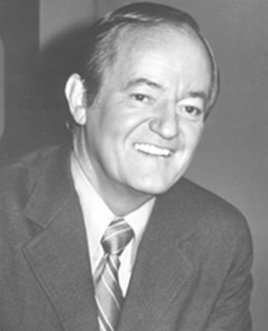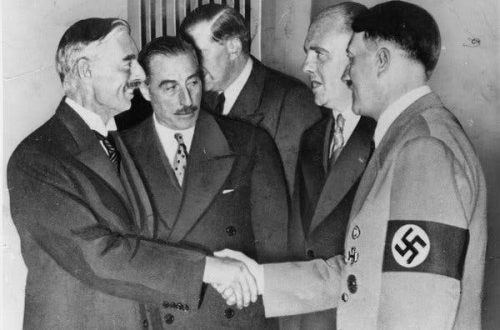
The moral test of government is how that government treats those who are in the dawn of life, the children; those who are in the twilight of life, the elderly; and those who are in the shadows of life, the sick, the needy and the handicapped.
–Hubert Humphrey
Writing in The New York Times, Rick Perlstein notes that Friday was the 100th anniversary of the birth of former senator, former vice president and 1968 Democratic presidential candidate Hubert Humphrey. And, in contrast to the tributes that poured forth on the one-century anniversary of Ronald Reagan’s birth– almost no one noticed.
That such a central figure in American history is largely ignored today is sad. But his diminution is also, more importantly, an impediment to understanding our current malaise as a nation, and how much better things might have been had today’s America turned out less Reaganite and more Humphreyish.
…..
Humphrey made his national political debut in 1948 when, as mayor of Minneapolis and a candidate for Senate, he headed the Minnesota delegation to the Democratic National Convention. There he led a faction insisting the platform include a federal fair employment commission, a controversial goal of the civil rights movement.Segregationist Southerners threatened to walk out, a move that could have paralyzed the entire fragile Democratic coalition and handed the White House to the Republicans. The Democrats’ first presidential defeat in 20 years might have been laid at the feet of this ambitious 37-year-old.
Humphrey could have been excused for quietly backing down. Instead, the man who had earned the nickname the Happy Warrior gave one of the greatest speeches in American political history.
“To those who say this civil rights program is an infringement on states’ rights,” he thundered from the convention podium, “I say this: The time has arrived in America for the Democratic Party to get out of the shadow of states’ rights and to walk forthrightly into the bright sunshine of human rights.”
The motion carried. The Southerners walked out and ran Strom Thurmond for president. When Harry S. Truman won nonetheless, Democrats were on their way to becoming the party of civil rights. Hubert Humphrey catalyzed that change.
And Strom Thurmond eventually became a Republican.
Sadly for Humphrey, after he became Lyndon Johnson’s vice president, the Democratic party split over the Vietnam war. While supporting civil rights and workers’ rights (he was a strong friend of trade unions), Humphrey was a dedicated anti-Communist– understanding better than many on the Left the damage that Communists did to the cause of genuine liberalism.
Soon Vice President Humphrey was the spokesman for the president’s unwise war in Vietnam. He took to the role partly out of loyalty, partly out of conviction: to a certain sort of old-line liberal like him, Vietnam was a crusade against imperialist expansionism. To younger “New Politics” Democrats, however, the war embodied the very opposite: a racist assault by an administration that was itself practically imperialist.
It was Humphrey’s misfortune to inherit the presidential nomination in 1968, with the Democratic Party split down the middle between these factions — a tragedy sealed in blood, after Humphrey’s faction won the convention, in the streets of Chicago; and at the ballot box, with Humphrey’s agonizingly close loss to Richard M. Nixon in the general election.
The defeat came in part thanks to his refusal to denounce the disastrous war in a forthright and timely fashion, and in part thanks to the abandonment of the ticket by the New Politics liberals who called him a warmonger (often, heckling him on the campaign trail, to his face).
Was Humphrey really as hawkish as all that? Johnson didn’t think so; he actually preferred that Nixon win the election. He didn’t trust Humphrey to hold firm on the war.
Poor Humphrey could never catch a break. Resolutely committed to quiet coalition-building at a time when ideological self-righteousness was the new normal, resolutely unhip at a time when political hipness was at a premium, he was now not just a loser but an embarrassment. He came in second place for the 1972 nomination; the victor, the self-righteous but significantly more hip George S. McGovern, then came in a distant second to Nixon.
Yes, Humphrey– wearing his liberal heart on his sleeve, unashamed to shed a few tears in public– was relentlessly unhip. And God bless him for it.
In the book by which many would remember that election, Hunter S. Thompson’s “Fear and Loathing on the Campaign Trail ’72,” each mention of Humphrey drips with mocking vituperation. Here, then, to many, is the Humphrey of history: an also-ran, a sellout, a joke.
For progressives today, however, the joke’s on us. In the 1970s the Democratic Party turned its focus from a New Deal-inspired politics of economic security toward a Watergate-inspired embrace of institutional reform. The move was explicitly anti-you-know-who: “We’re not a bunch of little Hubert Humphreys,” proclaimed Gary Hart, the leader of the “Watergate Babies” Democratic Congressional class of 1974.
Their reforms, however, largely failed in their intention to liberalize the nation. Conservatives and business interests were able to bend the new campaign finance rules and Congressional committee systems to their own ends. That, in turn, helped bring about what Paul Krugman calls the “Great Divergence”: the economic inequality that has made a mockery of ordinary Americans’ aspirations to join and stay in the middle class.
…..
[A]t a time when other liberals were besotted with affirmative action as a strategy to undo the cruel injustices of American history, Humphrey pointed out that race-based remedies could only prove divisive when good jobs were disappearing for everyone. Liberal policy, he said, must stress “common denominators — mutual needs, mutual wants, common hopes, the same fears.”In 1976 he joined Representative Augustus Hawkins, a Democrat from the Watts section of Los Angeles, to introduce a bill requiring the government, especially the Federal Reserve, to keep unemployment below 3 percent — and if that failed, to provide emergency government jobs to the unemployed.
It sounds heretical now. But this newspaper endorsed it then, while 70 percent of Americans believed the government should offer jobs to everyone who wanted one. However, Jimmy Carter — a new kind of Democrat answering to a new upper-middle-class, suburban constituency, embarrassed by industrial unions and enamored with the alleged magic of the market — did not.
…..
Mr. Carter saw to it that only a toothless Humphrey-Hawkins law passed — one that made fighting inflation the government’s implicit policy goal while the toll of high unemployment was given much lower priority.Hubert Humphrey died of cancer on Jan. 13, 1978, a Happy Warrior to the end. “Sometimes I felt discouraged,” his wife, Muriel, recalled, “but Hubert never did.”
Argue against his supposed heresies if you will. But the post-1970s deregulatory consensus that replaced them, embodied as much by Reagan then as Robert E. Rubin today, has hardly done a great job either. With unemployment once again at 9 percent, inflation minimal, corporate profits at record levels even in the face of criminal perfidy by bankers, the trade deficit at $48.2 billion and racial resentment running as high as ever, shouldn’t we perhaps spare a thought, on Hubert Humphrey’s 100th birthday, for his road not taken?
Amen. To every word.


